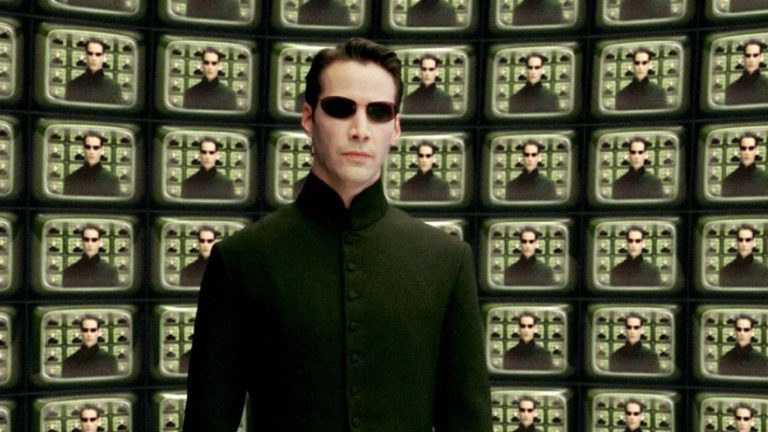The Matrix series forces us to ask these questions. Indeed, the pattern the first Matrix suggested in 1999 now feels familiar:
- Notice a ‘glitch’
- Read some websites
- Realize the world we once believed in might be fake
- Take the “red pill” and explore a new conception of what’s real
- Fight for liberty from those who created the fake world
So far, so good. We have some simple binaries: Real and fake. Good and evil. Man and machine. Red and blue. Now let’s eat some popcorn and watch the good guys beat up the bad guys.
To elaborate, taking the red pill reveals reality, whereas taking the blue pill leaves us in a dream world. Man is good, machines are bad. The Matrix’s rules are fake, so if you really want to, you can bend spoons and stop bullets. But then if you unplug from the pod, you’re back in reality, with real rules of physics.
Note how identity lies at the base of this story. The humans seek reality because they identify as human, not because of any specific feature of reality that they prefer over the Matrix.
As Robert Nozick argued, humans want to experience reality not because it’s more pleasant, but rather because it’s real, it’s natural. We look down on Cypher, not only because he betrays his human friends to the machines, but because he does so to live a fake, pleasant life. And the loyal fighters of Zion, as good humans, see it as shameful to serve as slaves to machines, no matter how nice the simulation feels.
Are “identity politics” all that remains when we can’t agree what’s real?
The Matrix’s best observation about human nature may come from Agent Smith: “Did you know that the first Matrix was designed to be a perfect human world? Where none suffered, where everyone would be happy. It was a disaster. No one would accept the program. Entire crops were lost… Human beings define their reality through suffering and misery.”
Scarcity may be an essential part of being human, to the effect that programmers may find the need to generate artificial scarcity in order to keep humans engaged.
So, what is real? And how do we know? The Matrix series asks these questions. It never answers them. Taking the red pill is just the beginning.
The Oracle is on the good side. But is she human? And as the series continues, we learn that Neo has at least some of his Matrix powers in the “real world,” too. Gradually, and then all at once, the binaries collapse.
The Matrix has become real in an important sense: increasingly large groups of people cannot discern, let alone agree upon, what is real.
As in the movies, it’s easy to see that the mainstream media, and its authoritative sources, exhibit glitches. Anyone who’s followed mainstream public health advice on COVID-19, or nutrition, knows that. But it’s much harder to know what’s real than to know what’s fake. And no one has enough time, or intelligence, to become an expert in every field. Division of labor by comparative advantage applies to knowledge, as well as economics.
No one can actually go to the source on each issue in their lives. So people substitute one authority for another, one hierarchy for another. Have they really learned the lesson, then? Neither trying to become an expert in everything, nor switching from one tribe to another, bring us closer to ultimate reality. They might very well lead you away from it.
Perhaps this all sounds like those post-modern philosophers you’ve been warned about. Fair enough. And if you want to go down this rabbit hole, I suggest following the work of Blake Smith and Geoff Shullenberger.
Yet the post-moderns weren’t the first to wonder whether value might be subjective, or whether our mental models might fail to faithfully explain and predict reality. Plato, Lao Tzu, and the Book of Ecclesiastes raised these questions long ago. Indeed, modern economics is based on the marginal revolution, and the idea that economic value is inherently subjective. This is not to say that moral values are subjective, or that we can bend the laws of reality to our will.
Indeed, it is an objective fact that we cannot wish away these basic questions. Political figures in both parties, and journalists of all stripes pine for a past era, back when we all agreed on what was real.
It’s not anything specific about America, or liberal democracy, however, that raises these questions. The most authoritarian regimes in the world are struggling with the same questions of identity and truth that we are. And they’re also trying to control the technology associated with these questions. We don’t know precisely what political or economic systems will survive the 21st century. We can predict that systems that require everyone to agree on a single model of reality will fail.
Isn’t that a good thing?














Add comment